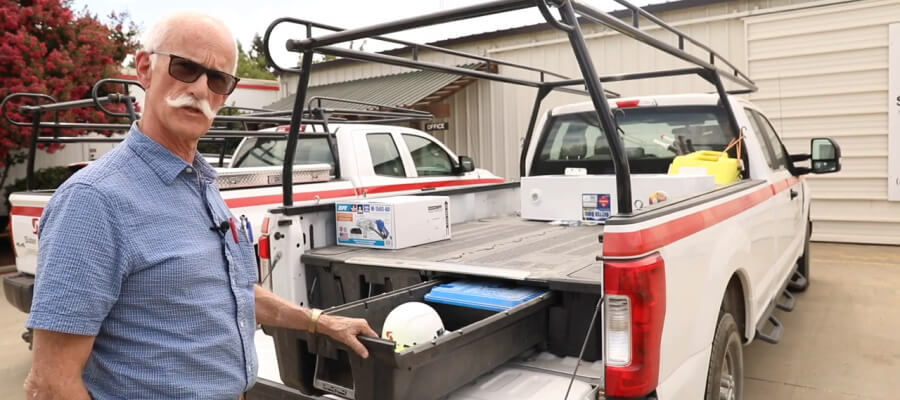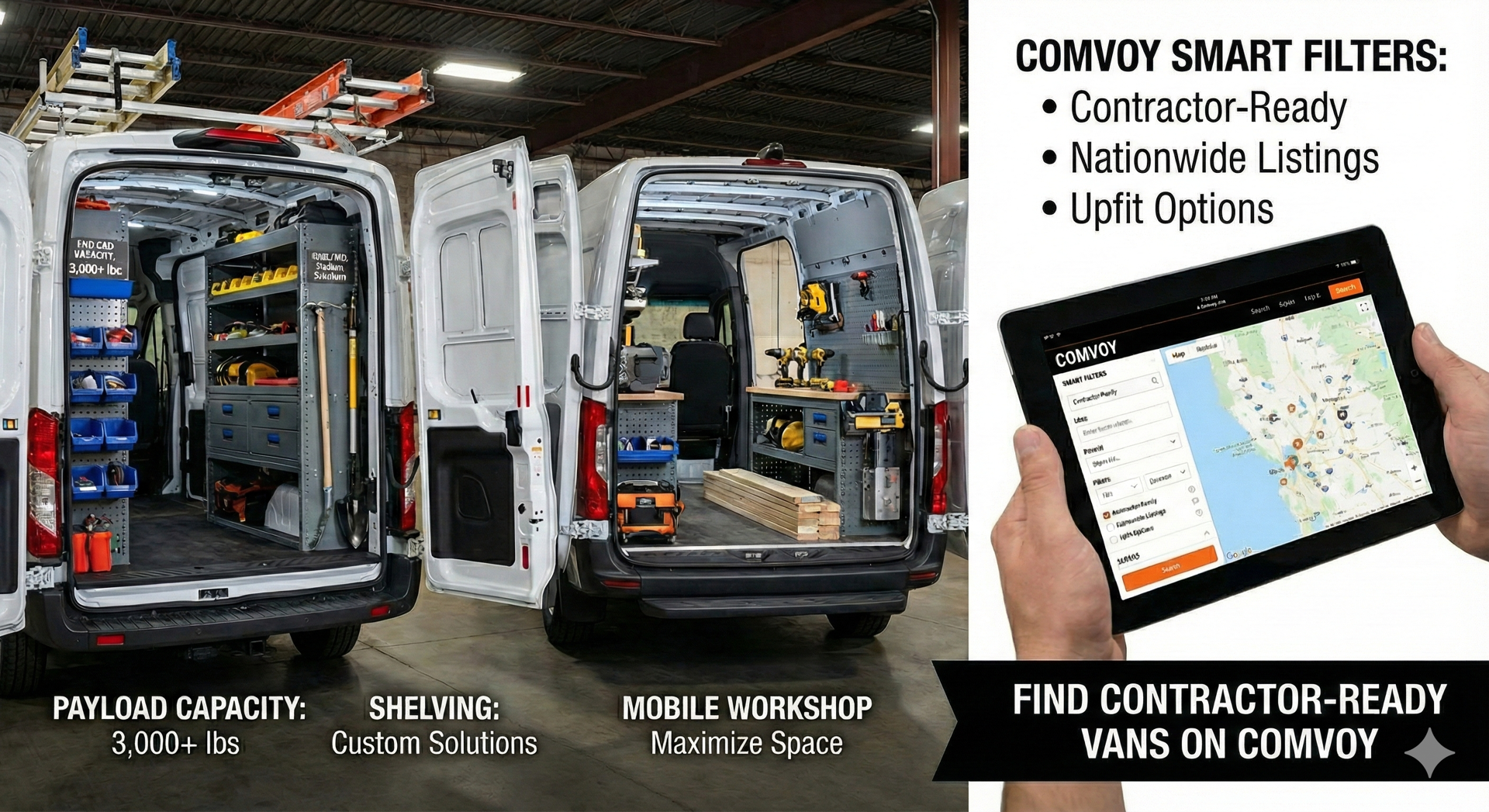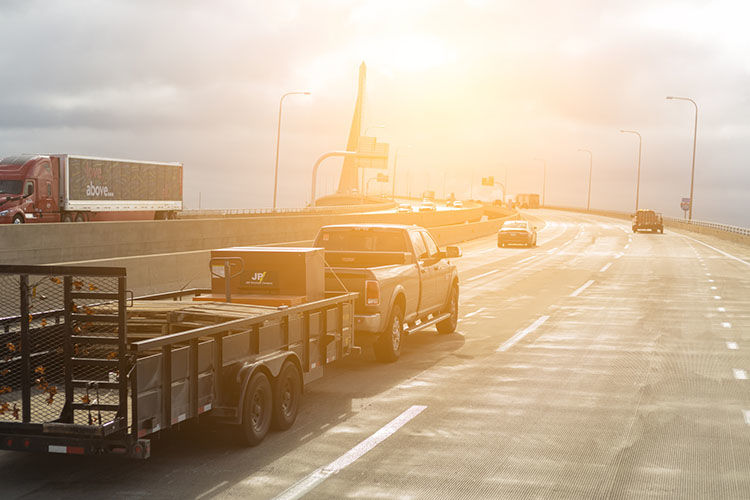15 Truck General Contractor Fleet chooses Ford Trucks, DECKED Truck Boxes & GPS


15 Truck General Contractor Fleet chooses Ford Trucks, DECKED Truck Boxes & GPS
We interview General Contractor Howard Slater of Slater and Son on the best general contractor truck for his business, what Ford trucks they use, DECKED truck boxes, using GPS for his truck trailers and how many miles they get out of a work truck before looking for a replacement.
- Howard chooses Ford Trucks in both F150 and F250 models as the best contractor trucks.
- Ford SuperCab trucks are preferred for storage and comfort over regular cab trucks.
- DECKED truck bed cargo boxes keep tools safe and secure while offering easier access than saddle tool boxes.
- 100k miles is the limit before looking to replace a work truck.
- GPS locators are used more for locating trucks and trailers, rather than for theft prevention.
Q: What is the best contractor truck for your commercial business?
A: We have about 15 vehicles in our fleet. We have really three different classes of vehicles. We have vehicles for our more office-oriented people like project managers, vehicles for our superintendents, and our field workers. The project managers primarily drive Ford F150 with crew cabs. Superintendents primarily drive Ford F250 with an extended cab or SuperCab as Ford calls it and a full-size bed. Our worker bees are more in Ford F250 with either a regular cab or an extended cab and a full-size bed.
Q: Are the Ford SuperCab trucks worth the added cost over regular cab trucks?
A: We are using a lot of regular Ford F250 SuperCabs for superintendents, workers, and craftsmen in the field. We have found that a lot of these guys are larger people and the regular cab just didn’t seem to have enough room for them and they have no room to store anything on the inside. And that’s one of the reasons that we’ve been transferring over the Ford F250 SuperCab. Another reason we are buying the F250 SuperCab or Extended Cab is because they have more storage in the back and the seats go back a little bit further so they can lean back.
Q:What kind of work truck storage do you prefer?
A: We have used a lot of saddle boxes, which work really nice, but they take up so much of the bed it makes it difficult to put material in the back. We’ve been moving toward Ford F250 with extended cabs recently so we can have storage on the inside. It is really common with the guys to add DECKED truck bed cargo boxes so they have a truck bed that they can store full-length material in. The full-length body gives them a ton of secure storage in that most of the tailgates now lock, so once the tailgate’s lock, the tools that are inside are secure. With the saddle boxes, you have to climb inside the bed to get to the center of the box, and it just doesn’t work very well.
Q: How many miles before you purchase a replacement work truck?
A: Typically, at a little over 100,000 miles, we’re ready to start moving on and get a new truck. We have one dealer we buy them through. We just call them up and read off what we want and they tell us how much it will cost and when it can be delivered. We start ordering all sorts of stuff to go on it, racks, toolboxes, so on and so forth. We get some equipment locally; some we get online. The racks we almost always get locally. As to the toolboxes, we get most of them online.
Q: Are you using GPS locators on the work trucks?
A: One thing we have done recently is put GPS locators on all the trailers and all the tractors. We haven’t put them on any of the vehicles, but we put them on everything else. The funny thing is the main reason we did it was not because we were worried about theft as much as we could never find the darn things. Before adding GPS when somebody needs a trailer and we don’t know where it is you would have to call around to find it. Now we just go online and boom there it is!
Q: What types of trailers do the truck's tow?
A: We typically use PJ Dump Trailers, we have one on every job plus a couple that we can shuffle in when they need more of them or need to swap them out. So, it’s got the 2 and 5/16th ball that we were talking about on it. We go to an oversized upgraded jack on it because we just find that they don’t get torn up quite as often.
It has a built-in cover so when we’re hauling something we can pull the cover back over because we never have tarps and we used to use tarps and they’re just a pain. It is very nice in that you can just pull it back, hook on the other end, ratchet it up and you’re done. One guy can do it. And it lifts up, so one guy can take the garbage to the dump and he can dump it without anybody there to help him unload it.
Published on: January 10, 2020 Driving Business Growth Through Financial Flexibility: How You Buy Your Truck Matters
Driving Business Growth Through Financial Flexibility: How You Buy Your Truck Matters Best Work Vans for Contractors
Best Work Vans for Contractors 2026 Commercial Trucks and Vans: What’s New from Ford, GM, and Ram
2026 Commercial Trucks and Vans: What’s New from Ford, GM, and Ram The Value of Work Ethic: Comvoy.com Promotes Mike Rowe's Work Ethic Scholarship Program
The Value of Work Ethic: Comvoy.com Promotes Mike Rowe's Work Ethic Scholarship Program Summer Fleet Maintenance: How to Protect Commercial Vehicles from Extreme Heat
Summer Fleet Maintenance: How to Protect Commercial Vehicles from Extreme Heat







